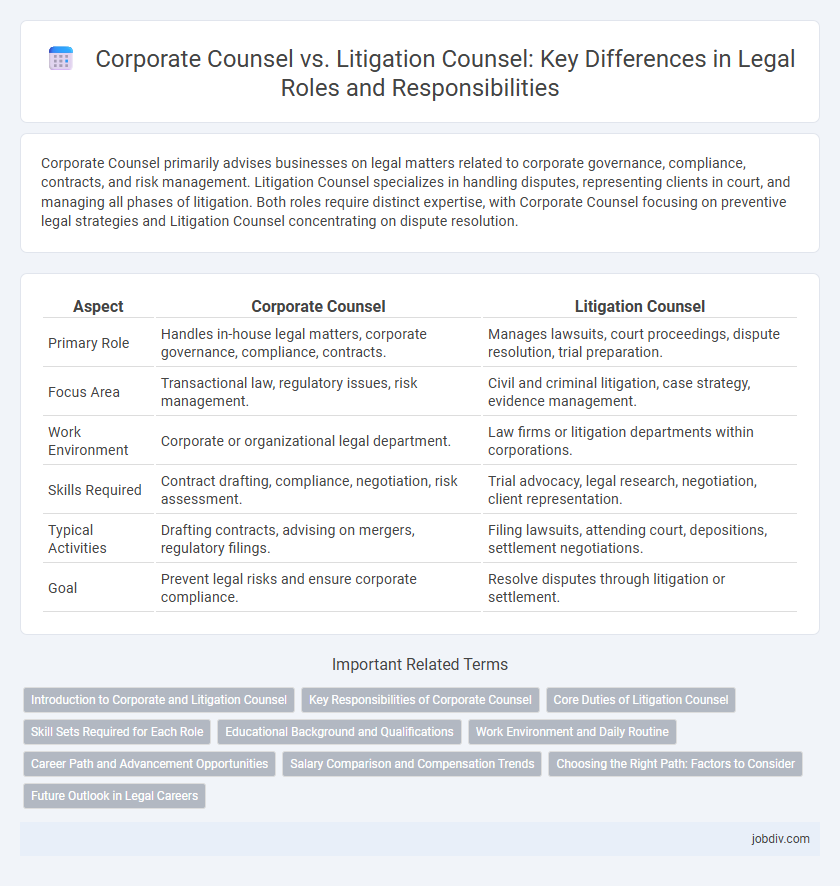Corporate Counsel primarily advises businesses on legal matters related to corporate governance, compliance, contracts, and risk management. Litigation Counsel specializes in handling disputes, representing clients in court, and managing all phases of litigation. Both roles require distinct expertise, with Corporate Counsel focusing on preventive legal strategies and Litigation Counsel concentrating on dispute resolution.
Table of Comparison
| Aspect | Corporate Counsel | Litigation Counsel |
|---|---|---|
| Primary Role | Handles in-house legal matters, corporate governance, compliance, contracts. | Manages lawsuits, court proceedings, dispute resolution, trial preparation. |
| Focus Area | Transactional law, regulatory issues, risk management. | Civil and criminal litigation, case strategy, evidence management. |
| Work Environment | Corporate or organizational legal department. | Law firms or litigation departments within corporations. |
| Skills Required | Contract drafting, compliance, negotiation, risk assessment. | Trial advocacy, legal research, negotiation, client representation. |
| Typical Activities | Drafting contracts, advising on mergers, regulatory filings. | Filing lawsuits, attending court, depositions, settlement negotiations. |
| Goal | Prevent legal risks and ensure corporate compliance. | Resolve disputes through litigation or settlement. |
Introduction to Corporate and Litigation Counsel
Corporate Counsel primarily manages a company's internal legal matters, including compliance, contracts, and risk management, ensuring business operations align with regulations. Litigation Counsel specializes in representing organizations in disputes, handling lawsuits, and managing trial procedures to protect the company's interests in court. Both roles are essential in mitigating legal risks and safeguarding corporate assets through proactive and reactive legal strategies.
Key Responsibilities of Corporate Counsel
Corporate Counsel primarily oversees legal compliance, contract negotiation, risk management, and corporate governance within an organization. They provide proactive legal advice to support business operations, ensure regulatory adherence, and draft or review contracts to minimize legal risks. Their role contrasts with Litigation Counsel, who focus on managing disputes, representing the company in court, and handling lawsuits or arbitration processes.
Core Duties of Litigation Counsel
Litigation Counsel specializes in managing and overseeing all phases of legal disputes, including case assessment, strategy development, and courtroom representation. Their core duties involve conducting discovery, filing motions, negotiating settlements, and representing clients in trials and appeals. They work closely with external counsel and internal stakeholders to mitigate legal risks and protect the organization's interests during contentious proceedings.
Skill Sets Required for Each Role
Corporate Counsel requires strong expertise in contract negotiation, regulatory compliance, and risk management, focusing on preventative legal strategies that align with business goals. Litigation Counsel must excel in courtroom advocacy, dispute resolution, and case strategy development, with skills centered on managing and arguing complex legal disputes. Both roles demand excellent communication, analytical abilities, and deep knowledge of relevant laws, but differ in their application of skills to either proactive legal support or reactive litigation.
Educational Background and Qualifications
Corporate Counsel typically hold a Juris Doctor (JD) degree with a focus on business law, corporate governance, and compliance, often complemented by certifications such as Certified In-House Counsel (CIC). Litigation Counsel usually possess a JD with specialized training in trial advocacy, civil procedure, and dispute resolution, frequently enhanced by experience in courtroom litigation and bar admission in multiple jurisdictions. Both roles require passing the state bar exam, but Litigation Counsel emphasize skills in trial strategy and evidence, while Corporate Counsel focus on transactional law and regulatory issues.
Work Environment and Daily Routine
Corporate Counsel typically operates within a company's in-house legal department, focusing on preventive legal strategies, contract negotiations, and compliance matters in a stable office setting. Litigation Counsel frequently works in law firms or specialized litigation units, managing active courtroom cases, drafting pleadings, and preparing for trials under more dynamic and deadline-driven conditions. The daily routine for Corporate Counsel involves cross-departmental collaboration and policy development, while Litigation Counsel's schedule centers on legal research, client advocacy, and court appearances.
Career Path and Advancement Opportunities
Corporate Counsel typically manages a company's legal affairs, offering broad exposure to contract negotiation, compliance, and risk management, which fosters advancement to roles like General Counsel or Chief Legal Officer. Litigation Counsel specializes in dispute resolution, building expertise in trial preparation, case strategy, and courtroom advocacy, paving the way for careers as senior litigators or partners in law firms. Both paths demand strong legal acumen and provide opportunities for leadership positions, with Corporate Counsel often favoring in-house advancement and Litigation Counsel excelling in law firms or specialized litigation practices.
Salary Comparison and Compensation Trends
Corporate Counsel generally commands a higher median salary than Litigation Counsel, reflecting the broader scope of responsibilities in corporate governance and regulatory compliance. Recent compensation trends indicate an increase in equity-based incentives and performance bonuses for Corporate Counsel, aligning their remuneration with company growth metrics. Litigation Counsel salaries, while competitive, tend to emphasize hourly or case-based compensation structures, influenced by billable hours and trial outcomes.
Choosing the Right Path: Factors to Consider
Choosing between Corporate Counsel and Litigation Counsel hinges on expertise in transactional law versus dispute resolution. Corporate Counsel typically manage contracts, compliance, and corporate governance, while Litigation Counsel specialize in handling lawsuits, trials, and legal disputes. Assessing career goals, preferred work environment, and skill sets in negotiation or courtroom advocacy is essential for selecting the appropriate legal path.
Future Outlook in Legal Careers
Corporate Counsel roles are expected to grow as businesses increasingly prioritize compliance, risk management, and strategic legal advice to navigate complex regulatory landscapes. Litigation Counsel positions continue to be vital but may face shifts due to advancements in alternative dispute resolution and increased reliance on technology-driven case management. Future legal careers will likely demand adaptability, with Corporate Counsel needing strong interdisciplinary skills and Litigation Counsel embracing digital tools for efficiency and outcome optimization.
Corporate Counsel vs Litigation Counsel Infographic

 jobdiv.com
jobdiv.com